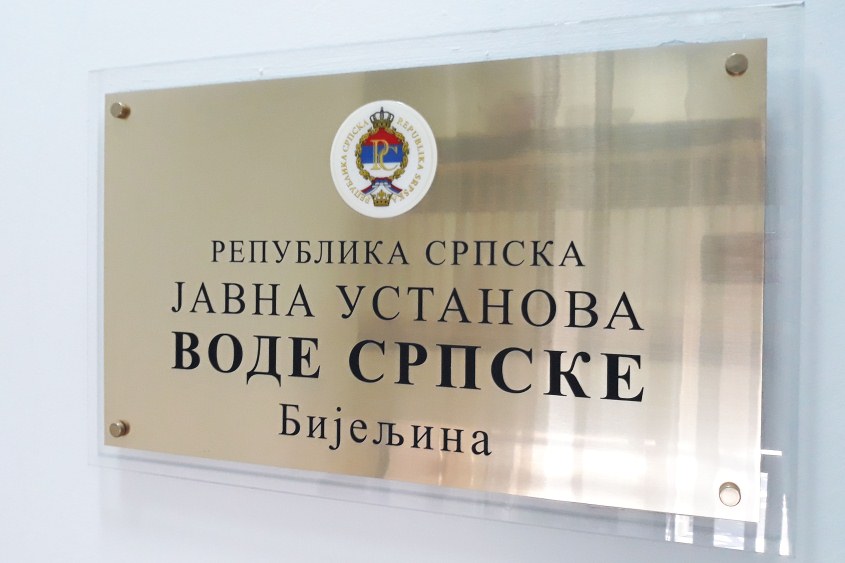On November 21 last year, the public institution Vode Srpske made a decision declaring “Institut za vode” (translation: Institute for Water) from Bijeljina the most favorable bidder in the public procurement procedure for providing water quality testing services for the watercourse of Republika Srpska for 2021 – chemical status assessment. The deal with “Institut za vode” was concluded through a negotiated procedure without the publication of a notice.
After Vode Srpske published the Notice on awarding the contract after the negotiation procedure, the company “Protehnik” from East Sarajevo complained about such a procedure, on November 29 last year. On December 22, 2021, the Office for Review of Complaints of Bosnia and Herzegovina rejected this complaint as unfounded due to the lack of active identification of the appellant.
“Based on the allegations of the appellant who exclusively disputes the proceedings, specifically doubts about the correctness and legality of the proceedings conducted by the contracting authority, this body, by inspecting the entire file, especially the appellant's appeal, and statement, determined that of the appeal against the published Contract Award Notice, the appellant did not prove in relation to the specific legal consequence in the specific case or at least made probable the existence of the facts and circumstances on which he bases the existence of a legal interest in lodging an appeal and that such conduct of the contracting authority caused him damage in the circumstances established by the contracting authority”, reads, among other things, the decision of the Office for Review of Complaints of Bosnia and Herzegovina.

This Office also states that the appellant failed to apply for the negotiation procedure on time and that it was determined that he did not meet the necessary conditions. Sources of Gerila info, however, claim that this explanation of the Office for Reviewing Complaints is invalid because possible non-fulfillment of conditions can be an obstacle only after submitting the documentation after announcing the public procurement.
Our sources also claim that the company “Institut za vode” is the only one invited to the negotiation procedure, although there are several other companies in Republika Srpska that deal with testing the chemical quality of water.
“Therefore, it was logical to announce a classic public call in order for as many interested bidders as possible to compete, and in the end, the final price could be, possibly, lower,” says the source of Gerila info.
Immediately after the decision of the Office for Review of Complaints, “Vode Srpske” made a decision to continue the implementation of the project.
“The implementation of the contract on testing the water quality of the watercourses of Republika Srpska in 2021 continues – the assessment of the chemical status was concluded with the “Institute za vode” Ltd. of Bijeljina. The Public Procurement Department is ordered to implement this Decision in accordance with the provisions of the Law on Public Procurement“, reads the decision of the Public Institution of Water of Srpska Bijlejina, which is in the possession of Gerila info.
The work of testing the quality of watercourses in the Republic of Srpska in 2021, which was finally awarded to the company “Institut za vode” after the appeal was rejected, cost “Vode Srpske” almost 300,000 KM, more precisely 249,453 KM.
“Institut za vode” was named the best bidder on November 11 last year. The same decision, where the company was named the best bidder, states that their bid is the only bid received.
“Apart from the fact that there are more than ten accredited laboratories for water analysis by the Accreditation Institute in RS and BiH, the contracting authority makes fictitious contracts for negotiation work and invites only one bidder who, miraculously, is the only one who meets the conditions,” said Guerilla Info.
What is interesting is that “Institut za vode” is located in the same building in Bijeljina as the public company “Vode Srpske”, from which it received valuable contracts, and the director and owner of “Institut za vode” owns an apartment in the same building. “Vode Srpske” is located on the floor between “Institut za vode” and the private apartment of the owner of “Institut za vode”, Milenko Savić. The offices of “Voda Srpske” and “Institut za vode” are at the address Miloša Obilića 51 in Bijeljina.

In the last five years, “Institut za vode” has received contracts from “Vode Srpske” on jobs with a total value of more than two million KM. The key is the friendship between the owner of “Institut za vode” and the director of Vode Srpske, Miroslav Milovanović, otherwise an SNSD official.
Our sources from “Vode Srpske” state that it is quite questionable in what way “Institute za vode” performs tests of water quality of watercourses in RS because there are not enough permanently employed professional staff. Approval for the work of the “Institute” is given by the commission that gives the approval for the work of the laboratory for water analysis. That commission, by the way, is formed by the public institution “Vode Srpske”.
So far, the public institution “Vode Srpske” has not answered our questions regarding the awarded contract after the negotiation procedure without publishing a notice to the company “Institut za vode”.

For now, the Fund for Environmental Protection of Republika Srpska has not answered whether they are aware of the way in which funds from their projects are spent. For now, “Institute za vode” has not answered our questions regarding their ability to realize the jobs they receive from “Voda Srpske”.
SDS MP in the National Assembly of Republika Srpska, Davor Šešić, told Gerila info that the Law on Public Procurement is quite clear.
“It is obvious that the management of Voda Srpske makes procurements in the way that suits them.” The law clearly specified how procurement is conducted and the tender is announced and what are the conditions for the negotiation procedure. Whether a company meets the conditions or not is determined after the bidders submit the documentation, it must not be assumed who meets the conditions and who does not,” Davor Šešić told Gerila info.
The company “Institut za vode” from Bijeljina became known to the public after the Office for Review of Complaints of BiH, in 2015, accepted their complaint against the procedure after which the Institute for Public Health of Republika Srpska assigned control of water for public use to Banja Luka Vodovod. The Institute of Public Health said at the time that BiH would become the first country in the region to allow private laboratories to control water for public use.
“Institut za vode” is allowed to control the quality of drinking water by the Decision of the Ministry of Agriculture, Water Management and Forestry of Republika Srpska during the mandate of Minister Radivoje Bratić. That decision is in contradiction with the Rulebook of the Ministry of Health of RS, to which, seven years ago, they drew attention from this ministry as well.
The current director of “Voda Srpske”, Miroslav Milovanović, was also the Minister of Agriculture, Water Management, and Forestry of Republika Srpska. He performed this function from December 2010 to February 2013.
Milenko Savić, director and owner of “Institut za vode” from Bijeljina, was also the Minister of Agriculture, Water Management and Forestry of Republika Srpska from 1998 to 2001.
“Institut za vode” Ltd. from Bijeljina, was created from the donation of equipment for testing water quality received by Republika Srpska, and through the then Water Agency (now Vode Srpske) the equipment was transferred to “Institut za vode”. According to our sources, that private company is now using that equipment to realize the contract with Vode Srpske.
Our sources also claim that the Office for Reviewing Complaints illegally rejected appeals against the award of the contract to “Institut za vode” after the negotiated procedure and that it was ignored that the negotiated procedure without publication of a notice can be carried out only in emergency situations, which was not the case here.
“Individuals from the top of Republika Srpska intervened to reject the appeal, ie members of their closest families who also have lucrative jobs with Vode Republike Srpske, concessions and the like,” says a source from Gerie from Vode Srpske.







